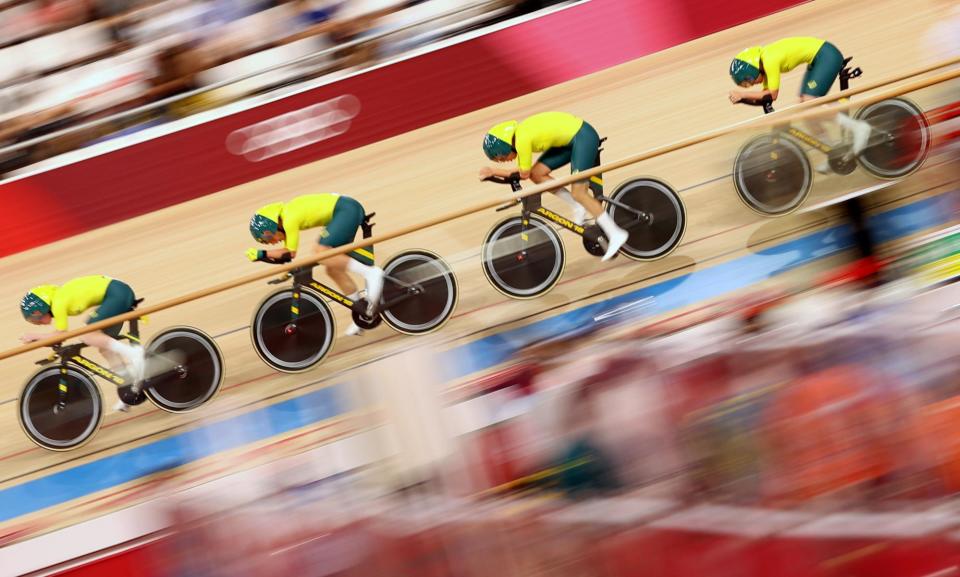Australian track cycling team wheels out $100,000 bike in pursuit of Paris Olympic gold

High-end bicycles do not come cheap. But scrolling through the online store of Factor Bikes, a cycling brand, prospective buyers could be forgiven for their shock at one particular price tag.
While most of Factor’s bikes retail for $10,000 to $15,000, deep-pocketed cycling enthusiasts can currently purchase the brand’s track bike for a whopping $97,979. That is not a typo – the top-of-the-line Hanzo track cycling bike is currently retailing for almost $100,000.
The bike is not gold-plated or diamond-encrusted. Instead, it is the Australian track cycling team’s bike of choice for the 2024 Paris Olympics, offering the latest in aerodynamic advancement in the hope it can deliver gold at the velodrome in August.
Related: Cycling calendar: the best places to bike in Australia every month of the year
Track cycling teams have always prioritised marginal gains, with milliseconds separating top riders on the world stage. But to avoid an uncontrolled arms race between well-funded national teams, the sport’s global governing body, the UCI, requires teams to use commercially available equipment.
The relevant technical regulation provides that “equipment shall be of a type that is sold for use by anyone practising cycling as a sport”. Teams who wish to use experimental equipment not on the market must seek official approval.
Accordingly, to ensure the Australian bike in Paris meets these requirements, Factor had to put the new bike on sale. But it would be self-defeating if rivals could make use of the same equipment, which national teams and their manufacturers spend months perfecting. Hence the eye-watering cost.
“We don’t set the price,” said Jesse Korf, executive general manager (performance) at AusCycling. “But in essence a bike has to be commercially available to meet regulations – there’s no regulation about the price.”
This rule applies to all equipment, meaning the space-age helmets, aerodynamic kit and event socks worn by riders must all be commercially available.
The rule is not taken lightly. At the last Olympics, both British Cycling and AusCycling lodged an appeal against Denmark’s use of aerodynamic undergarments, which the two nations alleged were not commercially available. The Danes ultimately won silver in the men’s team pursuit, with the protest rejected by the UCI commissaires’ panel.
Australia will be hoping no such controversies befall their new ride in Paris. The bike features extreme forks, customised 3D-printed titanium aerobars (no doubt subject to rigorous scrutiny after Alex Porter’s handlebars snapped at the Tokyo Olympics) and specialised wheels. A version of the bike shown to the media at an event in January also featured First Nations dot-painting decals.
“Our deep roots in engineering and aerodynamics has culminated in the creation of Factor Bikes’ first track bike,” the promotional material claims. “Designed for Olympic discipline pursuit racing, our track bike pushes the boundaries of speed to create the world’s fastest pursuit bike. Ready to launch off the start in Paris 2024, our track bike breaks the mould of stiffness, aero performance and speed.”
The bike was developed in close partnership with AusCycling, drawing on expertise from several Australian firms – including experts who work with Formula One and World Tour cycling teams, and the aeronautical sector.
“If we bring the best of Australia together for Australian athletes, what might that look like?” said Korf. “That’s what we embarked upon.” Factor is a British-owned firm, which manufactures in Taiwan – but is part-owned by Australian tech billionaire Scott Farquhar and has a strong Australian presence.
The $100,000 ride may be the one of – if not the most – expensive bikes in the world. But will it help Australia’s cyclists to gold in Paris? “I can only say that it is significantly faster – or lower drag – than previous bikes,” said Korf. “How will it stack up to the British bike or the Japanese bike? We can’t tell, because we can’t put them back to back in a wind tunnel.
“It is very fast – much faster than what we had – but whether or not it is the fastest, nobody can know,” he said. “That’s part of the thrill.”
Cycling fans wanting their own Factor track bike would be well-advised to wait. It is understood that after the Olympics, the price tag will drop to a more reasonable amount in line with the brand’s other models.

 Yahoo Sports
Yahoo Sports 